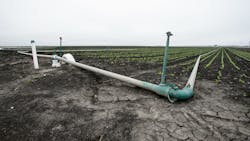Calif. awards $150M for groundwater management
In an effort to boost water supply reliability for millions of Californians, the California Department of Water Resources (DWR) has announced its first round of funding to 20 agencies responsible for managing critically overdrafted groundwater basins throughout the state.
A total of $150 million in funding is being awarded to regional groundwater agencies through the Sustainable Groundwater Management (SGM) Grant Program. The funding will go toward projects focused on water efficiency, groundwater recharge, feasibility studies for alternative water supplies, and the installation of monitoring wells.
The grant funding is made possible by a $171 million investment from the Budget Act of 2021 and will support other benefits such as improving drinking water quality and restoring habitat.
“Groundwater is a critical lifeline for millions of Californians and that is especially true during severe droughts like the one we’re experiencing right now,” said DWR Director Karla Nemeth in a press release. “We are dealing with the real-time impacts of a warming climate, and we know that less snowpack, precipitation, and surface water supply will lead to an increased reliance on groundwater. This first round of grant funding will help strengthen groundwater management, improve the reliability of those supplies statewide, and ensure access to safe and clean water for all Californians.”
This funding will support 119 individual projects across 20 groundwater basins, with 102 of those projects benefitting underrepresented or severely disadvantaged communities including Tribes. The awards include $40 million dedicated to projects within the San Joaquin Valley basin, a critically overdrafted region that is home to millions of Californians.
Announced projects include:
- In Kings County, the Mid-Kings River Groundwater Sustainability Agency’s Corcoran Irrigation District’s North Reservoir Project will construct new reservoirs for water storage and recharge basins. The project will directly benefit the Tulare Lake Subbasin by increasing groundwater availability and stability by recharging the aquifer, reducing groundwater pumping, and increasing groundwater quality.
- In San Joaquin County, the North San Joaquin Water Conservation District’s North System Improvement Project will direct excess surface water, when available, to recharge the subbasin through an approach known as Flood-Managed Aquifer Recharge (Flood-MAR).
- In Tulare County, the Lower Tule River Irrigation District’s Allensworth Project will divert flood waters in wet years from the White River to an 80-acre recharge basin, while also creating wildlife habitat and a recreational park.
- In Stanislaus County, the Del Puerto Water District will conduct three projects: the Los Baños Creek Recharge and Recovery Project, the Flood Water Capture Project, and the Cottonwood Creek Recharge Project, that will capture and recharge stormwater to support basin sustainability. The projects will capture peak flows while creating a seasonal habitat during known periods of migration along the Pacific Flyway.
Outside of the San Joaquin Valley, projects located in the cities of Paso Robles and San Miguel, once completed, will deliver approximately 5,000 acre-feet per year of recycled water from wastewater treatment plants to use as irrigation for parks and agriculture. This direct use of recycled water will reduce the need to pump groundwater from the basin and further improve the sustainability of the city's water supply and provide a supplemental water supply to irrigators in the basin.
Projects that will help improve drinking water supplies include the Santa Cruz Mid-County Groundwater Agency’s Aquifer Storage and Recovery Beltz Well 10 Project, which will store surface water, treated to drinking water standards, into the Santa Cruz Mid County Groundwater Basin for use as an underground storage reservoir. The drinking water will serve as a water supply during periods of water supply shortages or drought.
Additionally, a project through the Fox Canyon Groundwater Management Authority will identify and destroy up to 10 wells in the Oxnard Subbasin to reduce cross-contamination between two aquifer systems that serve multiple underrepresented communities in the area.
In addition to developing projects in these communities, the grant funding will help groundwater sustainability agencies revise their existing groundwater sustainability plans or plan alternatives. A full list of projects awarded funding can be found here.
Several non-governmental organizations in the state will partner with the GSAs to help implement these projects, including the Central Coast Wetlands Group, Stanford Foundation, River Partners, Sustainable Conservation, Self-Help Enterprises, Sequoia River Alliance Trust, Tulare Basin Watershed Partnership, California Partnership, and Borrego Valley Stewardship Council.
California is home to 515 groundwater basins, with the majority of residents relying on groundwater for some portion of their water supply. During dry years, groundwater contributes up to 60 percent of the statewide annual supply and serves as a critical buffer against the impacts of drought and climate change.
The SGM Grant Program will provide additional support for groundwater basins through a second funding solicitation later this fall, which will offer more than $200 million for planning efforts and projects in medium and high priority groundwater basins to help local agencies reach their groundwater sustainability goals under SGMA.
For more information about available funding, visit DWR’s SGM Grant Program page.
